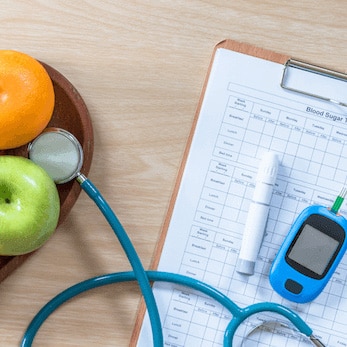Diabetes Overview
View or Print All Sections
What is Diabetes?
Diabetes occurs when your blood glucose, also called blood sugar, is too high. High blood glucose can cause health problems over time. The main types of diabetes are type 1, type 2, and gestational.

Symptoms & Causes
Increased thirst and urination, feeling tired, unexplained weight loss, and blurred vision are symptoms of diabetes. Many people have no symptoms and don’t know they have diabetes. Each type of diabetes has different causes.
Risk Factors for Type 2 Diabetes
You are more likely to develop type 2 diabetes if you have a family history of diabetes, are overweight or have obesity, or are 35 or older. Physical inactivity, race, ethnicity, and certain health problems also affect your chances of developing type 2 diabetes. A history of gestational diabetes is a risk factor for the parent and the child.
Preventing Type 2 Diabetes
You can prevent or delay type 2 diabetes by losing weight if you are overweight, being active for 30 minutes most days of the week, and following a reduced-calorie eating plan. Some people also take the diabetes drug metformin to help prevent type 2 diabetes.
Diabetes Tests & Diagnosis
Doctors use a variety of tests to diagnose diabetes and prediabetes. Your doctor may recommend different tests depending on whether you have symptoms or not, or whether you are pregnant.
Managing Diabetes
Managing your diabetes means managing your blood glucose, blood pressure, and cholesterol levels. Not smoking, leading a healthy lifestyle, and taking your medicines are important too. Work with your health care team to create a diabetes care plan that works for you.
Insulin, Medicines, & Other Diabetes Treatments
Following your diabetes treatment plan may include taking diabetes pills, insulin, or other shots, as well as medicines for related health problems. Some types of surgery—such as weight-loss surgery, also called metabolic and bariatric surgery—may be options for certain people with diabetes.
Healthy Living with Diabetes
Your diabetes meal plan helps you manage your blood glucose. Moderate physical activity most days of the week also helps control blood glucose. Talk with your health care team about a plan for eating and physical activity that is right for you.
Preventing Diabetes Problems
Diabetes can affect almost every part of your body. Managing your blood glucose can help prevent many other health problems that can occur when you have the disease. Common diabetes problems include
Other Types of Diabetes
Learn more about less-common types of diabetes.
Pregnancy & Diabetes
If you have diabetes and plan to get pregnant, or develop diabetes during pregnancy, you can take steps to keep yourself and your baby healthy.
Diabetes & Tobacco
Smoking and tobacco products can make diabetes problems worse, especially heart disease and foot problems.
If you smoke, stop. Ask for help so you don’t have to do it alone. Quitting smoking will improve your health.
Clinical Trials
The NIDDK and other components of the National Institutes of Health (NIH) support and conduct research into many diseases and conditions.
This content is provided as a service of the National Institute of Diabetes and Digestive and Kidney Diseases
(NIDDK), part of the National Institutes of Health. NIDDK translates and disseminates research findings to increase knowledge and understanding about health and disease among patients, health professionals, and the public. Content produced by NIDDK is carefully reviewed by NIDDK scientists and other experts.

